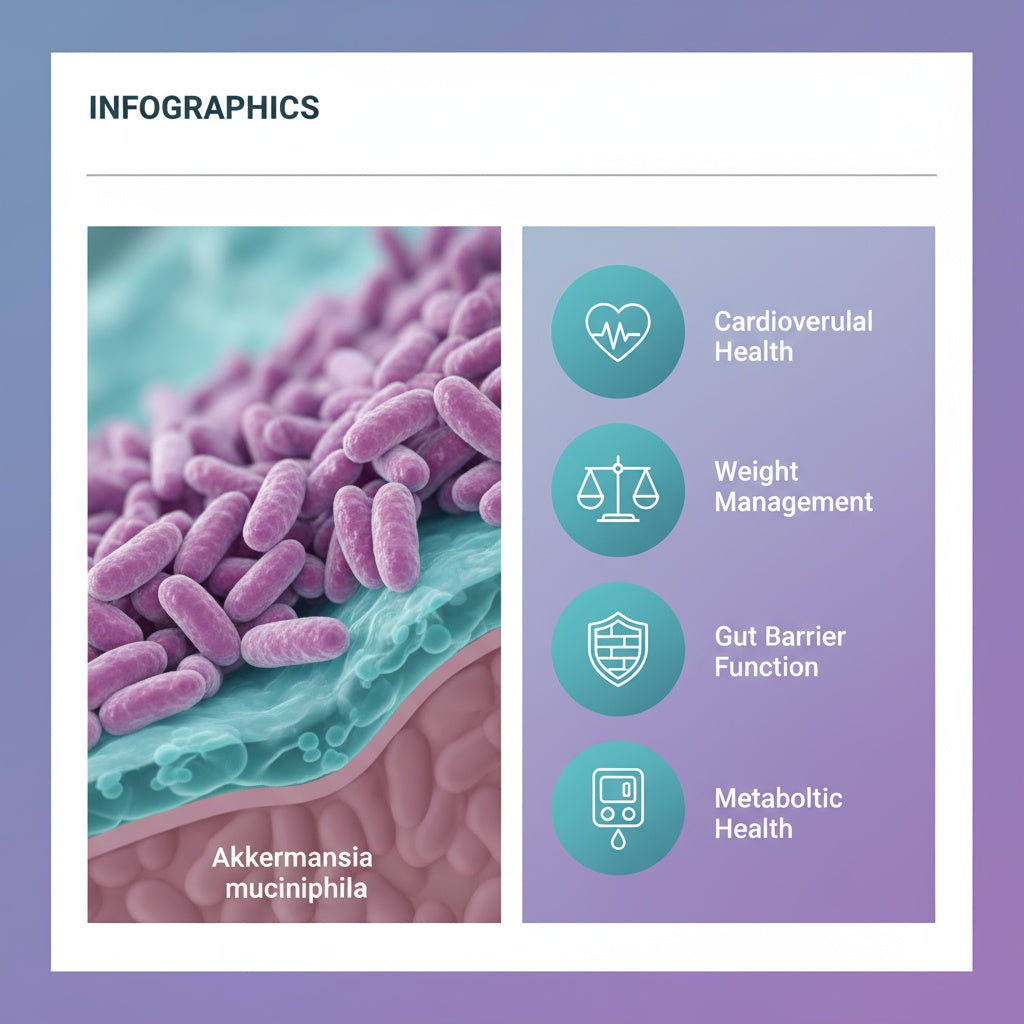
The Science Behind Akkermansia Muciniphila: Why This "Miracle" Gut Bacterium Matters for Your Health
Share
Akkermansia muciniphila has emerged as one of the most promising beneficial bacteria in gut health research. Often called a "next-generation probiotic," this remarkable microorganism is linked to metabolic health, weight management, and intestinal barrier function.
What Is Akkermansia Muciniphila?
Akkermansia muciniphila is a beneficial bacterium that naturally resides in the human gut, making up 1-4% of the intestinal microbiome in healthy individuals. Unlike traditional probiotics, Akkermansia thrives on mucin—a protein found in the gut lining—which helps maintain intestinal barrier integrity.
Key Characteristics:
- Location: Lives in the mucus layer of the intestinal wall
- Function: Degrades mucin while simultaneously stimulating its production
- Prevalence: Found in 90% of healthy adults
- Unique trait: One of the few bacteria that can survive and thrive in the gut's mucus layer
Health Benefits of Akkermansia Muciniphila
1. Metabolic Health & Weight Management
Research shows that higher levels of Akkermansia are associated with:
- Improved insulin sensitivity and glucose metabolism
- Better weight management and reduced obesity risk
- Enhanced fat metabolism and energy expenditure
- Lower inflammation markers related to metabolic syndrome
Studies have found that individuals with obesity and type 2 diabetes often have significantly lower levels of Akkermansia compared to healthy individuals.
2. Gut Barrier Function
Akkermansia plays a crucial role in maintaining the intestinal barrier:
- Strengthens gut lining by promoting mucus production
- Reduces intestinal permeability ("leaky gut")
- Protects against pathogens by maintaining the mucus barrier
- Supports immune function through gut barrier integrity
3. Cardiovascular Health
Emerging research links Akkermansia to:
- Improved cholesterol profiles (lower LDL, higher HDL)
- Reduced arterial inflammation
- Better blood pressure regulation
- Lower cardiovascular disease risk
4. Anti-Inflammatory Effects
Akkermansia produces short-chain fatty acids and other metabolites that:
- Reduce systemic inflammation
- Modulate immune responses
- Support anti-inflammatory pathways
- Protect against inflammatory bowel conditions
Signs You May Have Low Akkermansia Levels
While direct testing requires specialized microbiome analysis, certain indicators may suggest low Akkermansia:
- Difficulty losing weight despite diet and exercise
- Poor blood sugar control or insulin resistance
- Chronic digestive issues or "leaky gut" symptoms
- Elevated inflammatory markers
- Metabolic syndrome or pre-diabetes
- History of antibiotic overuse
What Depletes Akkermansia?
Several factors can reduce Akkermansia populations:Factor Impact Antibiotics Can significantly reduce Akkermansia levels High-fat Western diet Associated with lower Akkermansia abundance Artificial sweeteners May negatively affect Akkermansia populations Chronic stress Linked to reduced beneficial gut bacteria Sedentary lifestyle Exercise increases Akkermansia levels Low fiber intake Deprives Akkermansia of necessary substrates How to Increase Akkermansia Naturally
Dietary Strategies:
Polyphenol-Rich Foods:- Berries (cranberries, blueberries, blackberries)
- Green tea and black tea
- Dark chocolate (70%+ cacao)
- Pomegranate
- Red grapes and red wine (moderate consumption)
Prebiotic Fibers:- Oats and whole grains (Take Organic without the use of pesticides)
- Flaxseeds and chia seeds
- Jerusalem artichokes
- Garlic and onions
- Asparagus and broccoli
Specific Compounds:- Berberine (found in goldenseal, barberry)
- Capsaicin (from chili peppers)
- Omega-3 fatty acids (fish oil, algae oil)
- Cranberry extract
Lifestyle Factors:
- Regular exercise: Studies show physical activity increases Akkermansia
- Intermittent fasting: May promote Akkermansia growth
- Adequate sleep: Supports healthy microbiome balance
- Stress management: Reduces negative impacts on gut bacteria
Akkermansia Supplementation: What You Need to Know
While dietary strategies are effective, direct Akkermansia supplementation is emerging as a targeted approach:Benefits of Supplementation:
- Guaranteed dose of live Akkermansia bacteria
- Pasteurized forms shown to be effective and safe
- Clinical evidence supporting metabolic benefits
- Convenient for those unable to modify diet significantly
What to Look For:
- Strain specificity: Akkermansia muciniphila (strain verified)
- CFU count: Typically 10^9 to 10^10 CFU per serving
- Stability: Shelf-stable or refrigerated formulations
- Third-party testing: Quality and purity verification
- Clinical backing: Products with published research
The Future of Akkermansia Research
Current research is exploring Akkermansia's potential role in:- Cancer therapy support (enhancing immunotherapy response)
- Neurological health (gut-brain axis connections)
- Skin health (through gut-skin axis)
- Longevity (associations with healthy aging)
- Personalized nutrition (tailored microbiome interventions)
Key Takeaways
✅ Akkermansia muciniphila is a beneficial gut bacterium linked to metabolic health, weight management, and gut barrier function✅ Low levels are associated with obesity, diabetes, and inflammatory conditions✅ Polyphenol-rich foods, prebiotic fibers, and specific compounds can naturally boost Akkermansia✅ Lifestyle factors like exercise and stress management support Akkermansia growth✅ Supplementation offers a targeted approach for those seeking direct Akkermansia support
Frequently Asked Questions
Q: How long does it take to increase Akkermansia levels? A: Studies suggest dietary interventions can show effects within 2-6 weeks, though individual responses vary.Q: Can I test my Akkermansia levels? A: Yes, through specialized gut microbiome testing services that analyze stool samples.Q: Is Akkermansia safe? A: Research indicates Akkermansia is safe and naturally present in healthy individuals. Supplementation studies have shown good safety profiles.Q: Can antibiotics permanently reduce Akkermansia? A: While antibiotics can temporarily reduce levels, Akkermansia typically recovers with proper dietary support.
Want to support your Akkermansia levels? Explore our range of prebiotic supplements, polyphenol-rich extracts, and next-generation probiotics designed to promote optimal gut health.